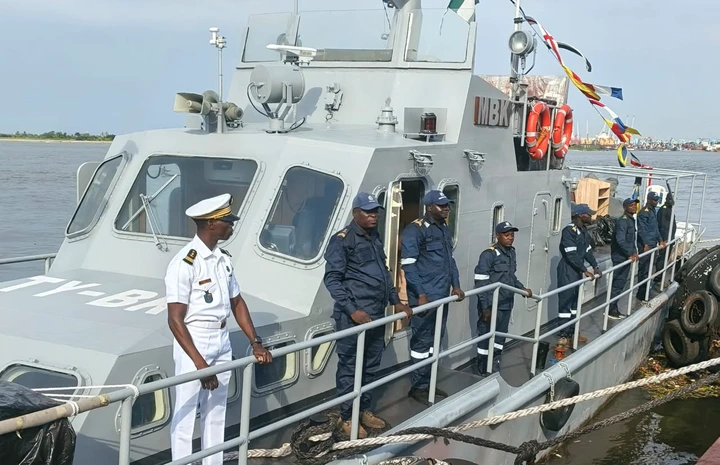The Nigerian Navy has handed over the rehabilitated Benin Navy Ship (BNS) Matelot Brice Kpomassé, to the Republic of Benin, marking the successful completion of the vessel’s first docking and overhaul.
Casting off from the Naval Dockyard Limited (NDL), Victoria Island, Lagos, where it was overhauled, Thursday morning, the warship set sail for Cotonou on its homeward voyage.
Speaking during the ceremony, the Chief of the Naval Staff, Vice Admiral Idi Abbas, said the refit exemplified the practical benefits of regional collaboration under the Yaoundé Architecture- the framework guiding joint maritime operations among Gulf of Guinea (GoG) nations.
Abbas who was represented by the
Admiral Superintendent, Naval Dockyard, Rear Admiral Ibrahim Shehu, said: “One of the key components of maritime security is the ability to deploy assets effectively for joint operations
“Through the capacity available at the Naval Dockyard and the guidance of our political and military leadership, we have created an environment that ensures both Nigeria and the Republic of Benin have more operational vessels for shared patrols and enhanced maritime surveillance.”
He noted that the collaboration between both navies was facilitated through the Joint Maritime Command Centre (JMCC) in Cotonou, which promotes intelligence sharing and operational coordination among member states. “Maintenance of naval assets is capital-intensive, but our proximity and established maintenance capacity have enabled us to provide cost-effective technical support to the Benin Navy,” he added.
The CNS revealed that several Benin Navy vessels have now been successfully refitted by the Dockyard, with two more ships expected for delivery within the next few weeks.
“Our goal is to complete the remaining three vessels before the end of this year or early next year. The Benin Navy has expressed satisfaction with our work, and we are finalizing an annual maintenance agreement that underscores their confidence in our technical expertise.”
He emphasized that the Dockyard adheres strictly to international standards and recognized classification rules in all repair works. “Our welders, mechanics, and technicians are certified and periodically evaluated to meet global standards,” he said, adding that the partnership reflected a model of regional self-reliance that reduces dependence on costly foreign facilities.
Responding to questions during an interview, Rear Admiral Shehu disclosed that the success of the Nigeria-Benin partnership has attracted interest from other Gulf of Guinea nations, including Equatorial Guinea, Congo, and Gabon. “Their defense advisors have approached our Defense Intelligence Agency for insights into the model.
“While discussions are still ongoing, we are optimistic that this cooperative approach will soon extend across the region, strengthening defense ties and promoting a safer Gulf of Guinea,” he said.
Representing the Chief of Naval Staff of the Republic of Benin, Commodore Alexandre Hounkpatin, Captain Mohamed Idrissou, who is the Director of Military Organisation and Personnel, commended the Nigerian Navy for its professionalism and commitment. “Having a reliable partner just two hours away from our base ensures rapid technical intervention and keeps our ships mission-ready,” Captain Idrissou said. “This partnership is a remarkable example of regional cooperation in action.”
He explained that Matelot Brice Kpomassé is the third Benin Navy vessel to undergo refit at the Naval Dockyard, with all three ships set to resume coastal patrols upon return. “Our fleet consists of vessels from different technical origins, both European and Chinese, each with unique maintenance needs. Before now, the lack of nearby facilities limited our capacity to maintain them. With Nigeria’s Dockyard, we have found a dependable partner that delivers world-class maintenance support,” he said.
Captain Idrissou reaffirmed his country’s commitment to sustaining the partnership, noting that maritime insecurity remains a shared challenge in the Gulf of Guinea. “Every country in the region must build its capacity to secure its waters and avoid becoming the weak link in our collective maritime security chain,” he added..view more

